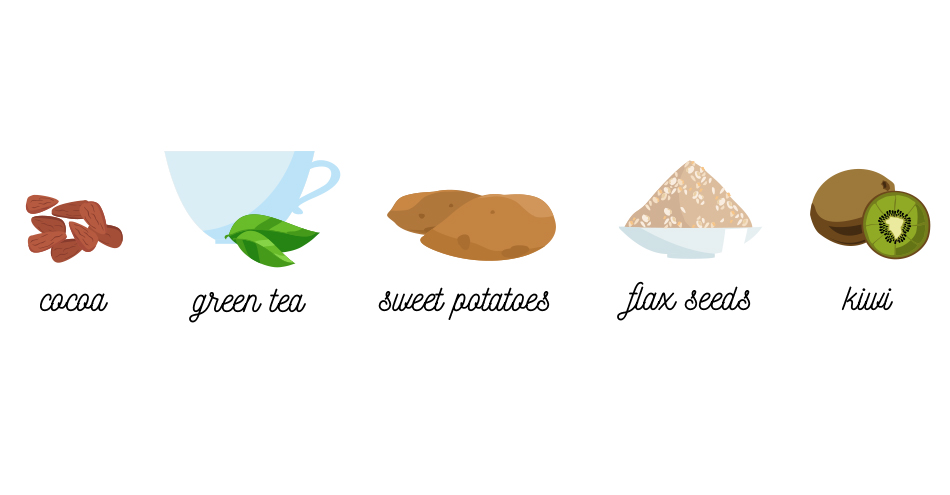You know the age-old saying: you are what you eat – and if we’re talking about complexion, the path to youthful looking skin might be through your stomach. Scientists are uncovering a number of nutrients found in certain foods that can help lessen the signs of aging skin, including wrinkles and dryness.
Cocoa
Embracing your inner Willy Wonka could be good news for your complexion. A 2015 study in the Journal of Nutrition determined that the consumption of high amounts of cocoa flavonols can reduce signs of photo-aging (like age spots and wrinkles), namely by having a positive impact on facial wrinkles and elasticity. Flavonols are powerful antioxidants that protect your skin against the damaging effects of environmental stressors like UV rays. Products with the most flavonols include dark chocolate bars (at least 70 percent cocoa), cacao nibs and natural (non-alkalized) cocoa powder.
Green Tea
Sipping this ancient beverage might be the answer to a youthful glow. An investigation by German scientists discovered that polyphenols in green tea may serve your skin well by offering up protection against UV radiation, as well as improving measures of skin quality such as elasticity and dryness. This skin-boosting power is likely owing to the ability of green tea polyphenols to increase blood flow and oxygen delivery to the skin. Aim to drink two or more cups of green tea daily.
Sweet Potato
If you enjoy spending time in the great outdoors, make sure to eat plenty of beta-carotene rich foods, like sweet potatoes, carrots and dark leafy greens, such as kale and collards. The nutrient has been shown to confer some natural protection against sunburn, which, in turn, may lower signs of photo-aging, as well as skin cancer risk. What’s more, a 2016 study in the Journal of the American Academy of Dermatology found that higher intakes of vegetables and fruits can be protective against adult acne.
Flax
Reach for that bag of ground flaxseed more often. A report in the British Journal of Nutrition determined that daily flax consumption can reduce skin reddening and improve skin hydration, which limits roughness and dryness. The abundance of omega-3 fats can help your skin retain moisture. Other omega-3 powerhouses include hemp seeds, chia, walnuts and fatty fish including salmon, sardines and mackerel.
Kiwi
Just one of these fuzzy fruits has more than a day’s worth of vitamin C, making it a skin-loving edible. British researchers showed that people who took in the most vitamin C had the lowest risk of a wrinkled appearance and skin dryness. Vitamin C plays an important role in the synthesis of collagen, a structural protein responsible for holding the connective tissue in your skin together. As an antioxidant, vitamin C can also help mop up the free radicals that wreak havoc on healthy skin cells and accelerate skin aging. You can also get more skin-friendly vitamin C through oranges, strawberries, bell peppers, broccoli and kale.
Environmental Nutrition is the award-winning independent newsletter written by nutrition experts dedicated to providing readers up-to-date, accurate information about health and nutrition in clear, concise English. For more information, visit www.environmentalnutrition.com.










